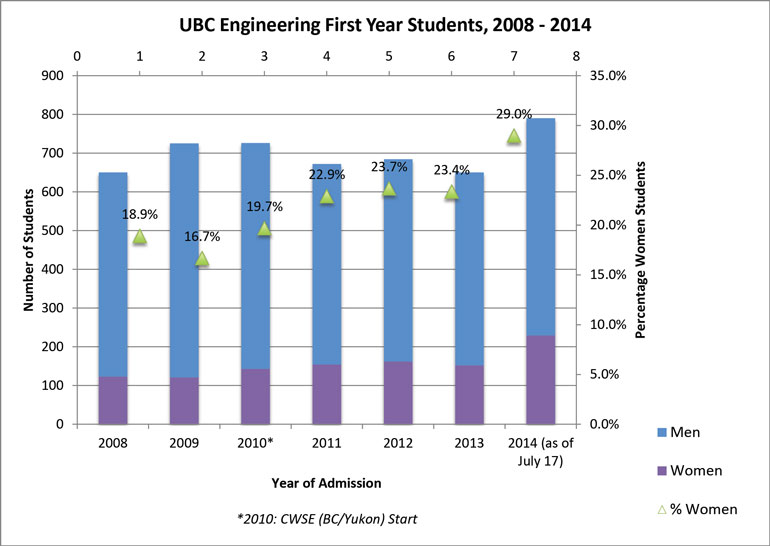Targeted outreach, community partnerships drive change
The number of women registered in first-year engineering undergraduate programs at the University of British Columbia is on the rise, up 61 per cent since 2010.
Nearly three out of 10 students (29 per cent) in UBC’s first-year engineering programs are women, up from 19.7 per cent in 2010.
“These numbers reflect the tremendous efforts we’ve made to recruit the best, brightest and most diverse applicants to UBC Engineering,” said Elizabeth Croft, associate dean, education and professional development at UBC’s Faculty of Applied Science.
Croft, a mechanical engineering professor, was appointed NSERC Chair for Women in Science and Engineering for BC and Yukon in 2010.
She initiated Westcoast Women in Engineering, Science & Technology (WWEST), a program that supports the recruitment and retention of women in engineering, science and technology through workshops, talks, technical tours and mentorships.
Since 2010, WWEST has connected with more than 2,300 young women across B.C., in partnership with over 20 community and non-profit groups.

Nearly three out of 10 students (29 per cent) in UBC’s first-year engineering programs are women, up from 19.7 per cent in 2010.
Engineering shortage
Canada is expected to have a shortage of 102,000 engineers by 2020, according to Ottawa-based Engineers Canada.
Recruiting women into the profession will play a big part in avoiding a major shortage, said Marc Parlange, dean of UBC’s applied science faculty, which includes the engineering programs.
“Admissions will continue to be based on the highest competitive averages coupled with personal profiles that help us identify truly exceptional students,” Parlange said.
“By constantly creating awareness of engineering as an exciting profession that offers solutions to societal challenges, we hope to increase the number of women in our undergraduate engineering programs to 50 per cent, from the current national average of 20 per cent.”
Video: UBC engineering prof. Elizabeth Croft is programming robots to interpret physical cues from humans.
Note to media: Elizabeth Croft is available for interviews. Contact milena.constanda@ubc.ca for scheduling.

